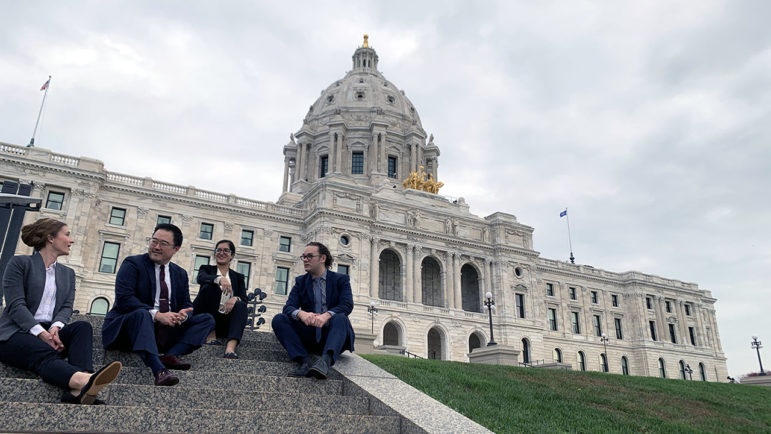
Fresh Energy is building upon the work we have engaged in on diversity, equity, and inclusion, and diving into a deeper analysis of anti-racism at our organization. In January of 2021, Fresh Energy published our Commitment to Anti-Racism which was sparked by the uprisings for racial justice here in Minnesota and across the country following the murder of George Floyd—events that shook us all.
Experiencing the uprisings coupled with the climate consequences of the COVID-19 pandemic, heatwaves, and wildfires—and the health impacts from the physical, mental, and emotional stress of all this trauma—pushed us to look deeper. Our Commitment to Anti-Racism lays out actionable guidelines on how we must hold ourselves accountable as we strive to influence change in the systems we work in both outside of Fresh Energy and within as a team.
Fresh Energy has been committed to learning and challenging ourselves to understand what the role of energy policy experts at a nonprofit organization looks like in undoing institutional and systemic racism. This takes a lot of careful and intentional conversations and turning ideas that arise into action. This is an ongoing practice in discovery, strategy, implementation, evaluation, and restructuring; a continuous cycle that gives us the opportunity to evolve even when we make mistakes.
Much of Fresh Energy’s earlier equity-focused work was based on partnerships with leaders and organizations or was determined by funding. But that wasn’t enough. It became clear that stronger structural support was needed within the organization to advance equity. This is a common challenge faced by many nonprofits striving to tackle some of the most challenging issues of our time—and it underscores the need for a dedicated structure to hold priorities of equity within the development and culture of the organization.
In my time at Fresh Energy, one of the most important shifts I have seen within the organization is the work going into connecting the narrative of clean energy to climate justice. Once people understand these issues are woven together, we can begin working on solutions to the climate crisis that account for the compounding impacts of oppression.
Explicitly naming anti-racism as part of the work of clean energy policy experts makes the most sense once it is fully understood that racism is tied to the climate crisis. This is true because it is the countries and communities that are Black, Indigenous, and of people of color that are hurt first, worst, and longest by climate emergencies—and racism is accelerating the harm. We must acknowledge that truth and hold it as a foundational element to our work.
Looking ahead to what’s next at Fresh Energy, I am encouraged that our team is committed to centering equity in everything we do, and I am thrilled that the Energy Access and Equity team is leading the way.
We will continue to put into practice our commitment to anti-racism throughout Fresh Energy’s operational and administrative teams and procedures, ensuring our workplace is welcoming for current and prospective employees. We are also tracking our staff demographics to ensure our workplace is welcoming to all people who work or are seeking to work here. Our staff-led committees meet monthly to tackle questions on race, gender, power, wellness, and more. These committees serve as an incubator for implementing better organizational policies that recognize staff as whole people, not just employees.
In addition, the leadership team of Executive Director Michael Noble, Deputy Director Sarah Clark, and Senior Director of Operations Mat Larson Krisetya have come together to form the Anti-Racism Working Group that I have joined in my new role as Director of Culture and Partnerships to ensure that there is connective communication for the strategies of anti-racism to flow organization-wide. The work of anti-racism also extends to our board of directors, as they are integral partners in setting Fresh Energy’s strategic direction. We have many new faces and perspectives at the board, and I am looking forward to leading alongside them toward a bolder and more ambitious Fresh Energy that firmly centers principles of anti-racism, justice, and equity—as much an ongoing practice as it is a goal.
Fresh Energy has no shortage of commitments and ambition toward decarbonizing the economy and building a more just and equitable climate future for all. Yet, there is still so much for us to learn. We know that we will reach hurdles that will serve as teachable moments and opportunities to stretch ourselves further. As we move into the fall and winter seasons, we will continue working to set ourselves on a new course for deeper analysis and reflection. I am hopeful—even as we are continuously tested by the straining challenges of our time—that we have the intelligence and compassion to move us towards our vision for a just and equitable climate future.
